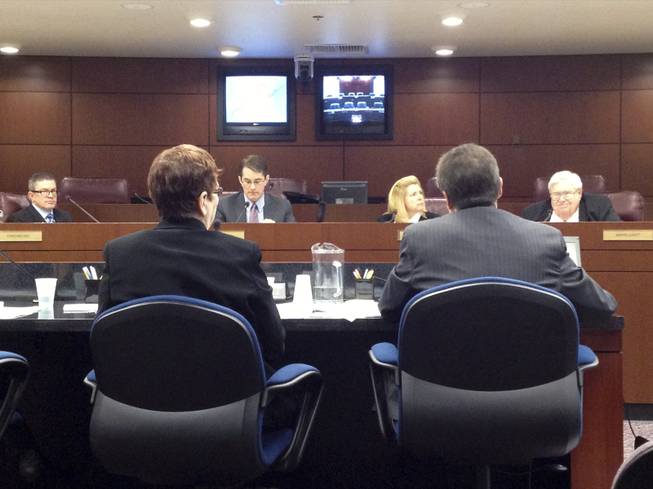
David Schwartz
Janet Rogers, budget office economist, and Russell Guindon, principal deputy fiscal analyst, present tax forecasts to members of the Starr’s Economic Forum. From left, they are Chris Nielsen, Ken Wiles, Linda Rosenthal and Marvin Leavitt. The fifth member of the forum was absent because of personal reasons, Friday, Nov. 30, 2012.
Published Friday, Nov. 30, 2012 | 9:52 a.m.
Updated Friday, Nov. 30, 2012 | 5:10 p.m.
A state panel of private business leaders forecast modest growth in gaming, sales and other state taxes as Nevada’s economy crawls back from the recession.
The projections of $5.81 billion for the next two years sets the stage for a tight budget that will be submitted by Gov. Brian Sandoval in January and virtually ensures that budget will include some taxes that were set to expire next year.
The state’s Economic Forum projected $2.811 billion in general fund revenue in fiscal year 2014 and $3 billion in revenue for fiscal year 2015. Taxes in the current biennium total $6.16 billion.
That’s a dip from the current biennium, but only because some temporary taxes first passed in 2009 are set by law to expire at the end of the fiscal year. Sandoval has already said he will seek the extension of some or all of those tax increases, but that extension couldn’t be considered by the Economic Forum.
“This is in line with what we expected,” said Jeff Mohlenkamp, Sandoval’s budget director, after the Economic Forum met on Friday.
“We are in a period of significant financial uncertainty,” said Ken Wiles, chair of the Economic Forum. “It’s always a challenge to forecast when so much is happening outside of our purview.”
Sandoval, in the budget he proposes, will recommend whether to extend all or a portion of the sunsetting taxes, which raised about $620 million last session. The Legislature, which is controlled by Democrats, has final say over the budget and taxes.
But if lawmakers want to pass additional tax increases, it would take a two-thirds vote. That means for the third consecutive session money is expected to be tight for state agencies, school districts and higher education.
The state is required to balance its budget, which means revenues must meet expenses. In October, agencies requested $6.4 billion in spending for the next two years, a slight increase in the current biennium spending of $6.2 billion.
But those agency requests reflect tight limits put on them by the Sandoval administration and include only necessary increases like federal mandates and utility costs. Some Democrats, the teacher’s union and advocates for the poor and disabled say that the state’s budget has been ravaged by budget cuts since 2008.
Teaching positions have been eliminated in Clark County School District, and the state has the lowest high school graduation rate in the nation.
Adding to the budget pressures, state officials are projecting more poor Nevadans turning to it for health insurance. And that’s before Sandoval decides whether to expand Medicaid under the federal Affordable Care Act.
The Economic Forum offered some cautious optimism in key sectors that fund the state budget.
The tax on casinos’ gambling win, which makes up 21 percent of the state’s general fund budget, are projected to rise by 3.6 percent in the first year and 3.4 percent in the next year.
But the gaming win has been buoyed by baccarat, which is driven largely by about 150 international high rollers, state gaming analysts said.
Marvin Leavitt, a member of the Economic Forum, said: “It becomes scary, at least to me scary, such a major revenue source for the state depends” on so few players.
“If 150 people worldwide decide to change their habits, move someplace else, it could drastically affect our numbers,” Leavitt said.
Sales tax, which makes up 27 percent of the state budget, is projected to grow by 4.8 percent next year, followed by 4.1 percent growth in fiscal year 2015.
Economic Forum members, who all come from the private sector, pointed to rising consumer confidence and an increase in visitor spending on food and beverage and luxury items.
Nevada is one of the few states in the country that still has a Legislature that meets once every two years and attempts to pass a budget to last through that period. The uncertainty surrounding the state’s tax on insurance premiums was a perfect example of the difficulties that presents, as members of the Economic Forum struggled to come up with an accurate estimate that is supposed to last through June 30, 2015.
“The challenge here is we really don’t know,” said Ken Wiles, the Economic Forum chairman.
“The whole thing is a guess,” Leavitt said.
The findings by the Economic Forum, which followed detailed presentations by state agencies, executive budget staff and Legislative staff, are binding.
The state’s Economic Forum — an impartial, nonpartisan panel of business leaders — has been tasked with making revenue projections 1990s. In prior years, lawmakers had been accused of fudging projections to increase funding.

Join the Discussion:
Check this out for a full explanation of our conversion to the LiveFyre commenting system and instructions on how to sign up for an account.
Full comments policy